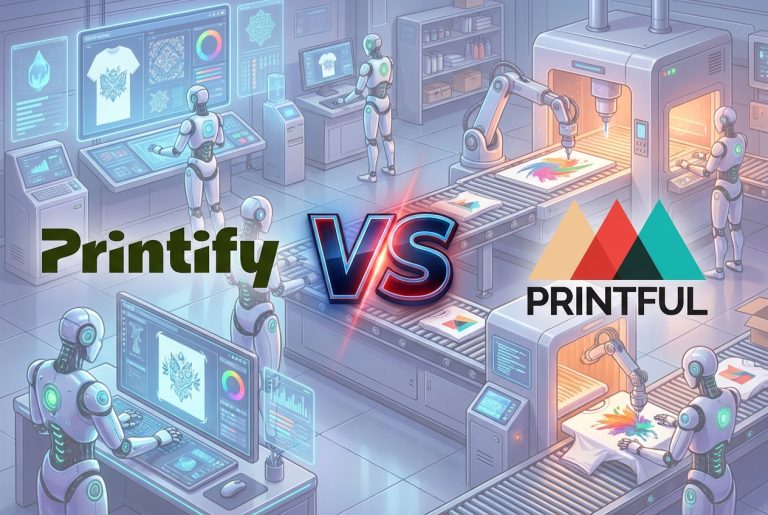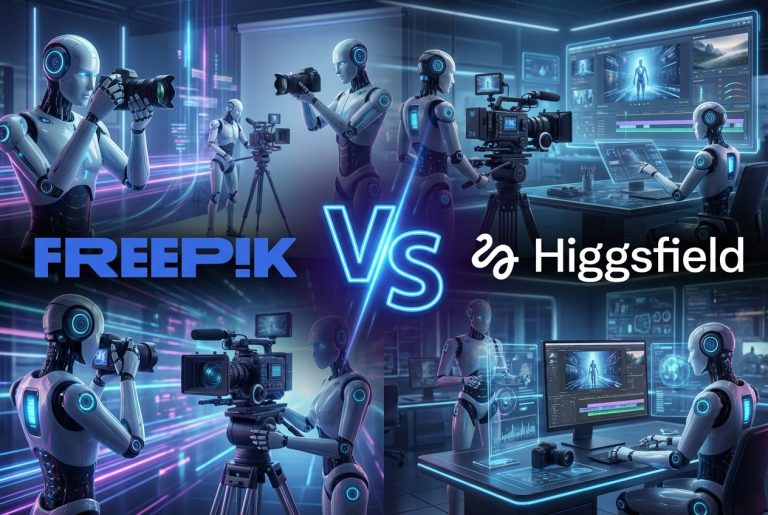10 Effective Ways to Use AI in SEO

As an SEO expert, you have probably experienced a situation in which you were trying your best to figure out why your client’s or your website is stuck on page 47 or even further down Google search results. It’s, unfortunately, completely normal. The digital marketing world is experiencing a big transformation that would make even the most experienced marketer do a double-take. Artificial Intelligence plays a very crucial part in this transformation, which we’re going to thoroughly discuss in this article.
Following recent SEO updates and studies, we can say that AI-powered tools are becoming very crucial to modern SEO strategies.
What is AI in SEO?
AI-based SEO integrates artificial intelligence into search engine optimization, transforming analysis, content creation, and optimization through machine learning, natural language processing, and predictive analytics.
Google’s AI evolution began with RankBrain in 2015, which improved query understanding. BERT followed, processing entire sentences bidirectionally for better context comprehension. Google’s latest MUM algorithm surpasses BERT by handling text, images, and videos simultaneously. This AI integration fundamentally changes SEO strategy across all components.
We know that it’s a lot, and new tools and algorithms are being introduced very often, but by staying updated with all of the changes, you can stay ahead of your competition and understand how AI affects SEO.
10 Effective Ways to Use AI Tools for SEO
- Keyword Research and Topic Ideas Generation
Keyword research used to be a very long, boring, and hard process. Mainly because of the manual aspect of it. However, AI has completely changed the whole game. New technologies can give you an opportunity to skip those manual tasks, crunching those massive datasets in seconds, or spotting patterns that would take hours to find by yourself.
Now, here’s the thing about AI tools like ChatGPT—they won’t give you exact search volumes or keyword difficulty scores like dedicated SEO platforms do. However, AI tools stand out in the creative phase. So, if you feel stuck in generating keyword ideas, finding related terms, and coming up with valuable long-tail keywords, it’s a perfect opportunity to use Artificial Intelligence to get some creativity into your routine.
Here’s where AI becomes your secret weapon: uncovering those hidden keyword gems that most people overlook. Search engines don’t just look for exact keyword matches anymore – they’re trying to understand the full context of what you’re talking about. That’s where LSI (Latent Semantic Indexing) keywords come into play.
Here’s a prompt that we prepared to help you with your first steps into AI-based keyword research: “Generate 20 long-tail keywords about ‘sustainable fashion’ that include buying guides, product comparisons, and eco-friendly materials, covering various user intents”.
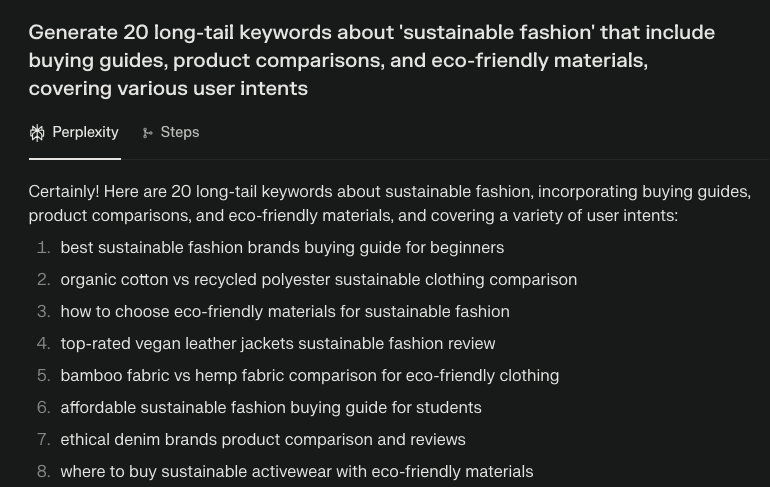
Source: Perplexity.ai
AI can transform your keyword lists into detailed AI content outlines, helping content creators organize articles that thoroughly cover topics while naturally incorporating semantic keywords throughout their content strategy.
- Identifying User Search Intent
Understanding search intent is crucial for creating content that ranks well and satisfies searchers. AI SEO tools can analyze search queries and categorize them into informational, navigational, commercial, or transactional intent with remarkable accuracy. AI examines the context surrounding keywords, analyzes SERP features, and predicts what users truly seek when performing specific searches.
Here’s the perfect prompt for this action: “Analyze the search intent for these keywords: ‘best project management software,’ ‘how to manage remote teams,’ ‘Asana vs Trello comparison.’ Categorize each by intent type and suggest the most appropriate content format for each.”
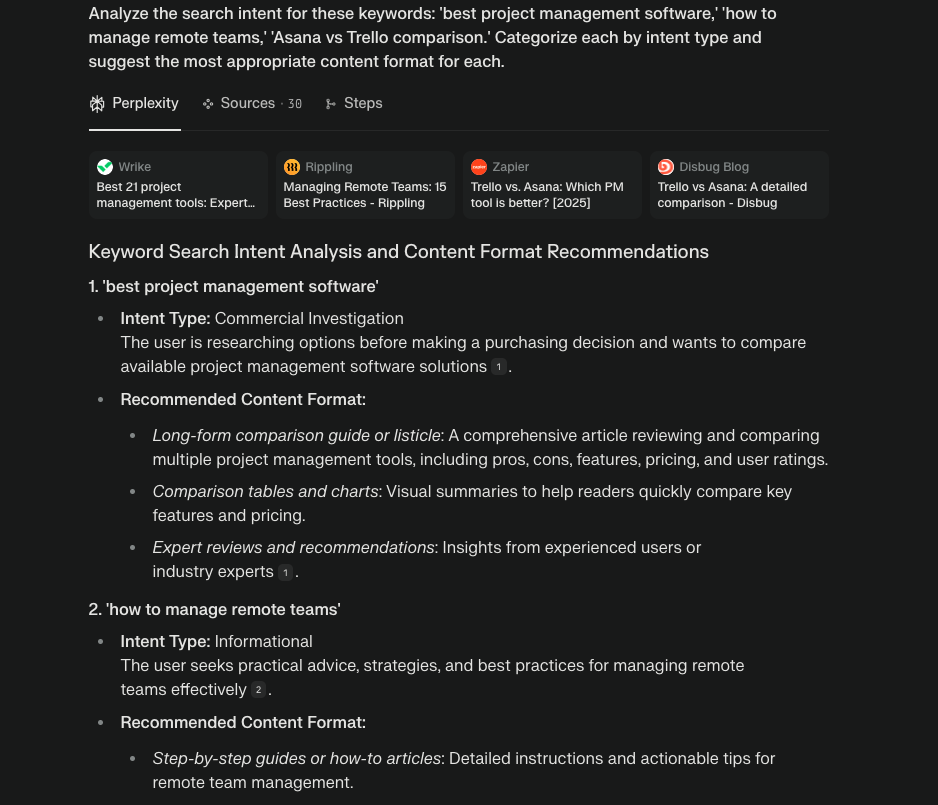
Source: Perplexity.ai
- Creating Topic Clusters
A part of every content strategy, something that you need to excel at, is topic clusters. Thanks to them, you can create comprehensive coverage around central themes. And good for you, AI can help you with that as well. Some tools are capable of identifying semantic relationships between topics and, what’s more, organizing them into logical clusters that demonstrate topical authority.
That’s not all AI can do for you in this topic. It can also analyze your existing content, identify gaps in it, and suggest new, better content ideas that will strengthen your overall relevance. Those solutions align with Google’s preference for websites that demonstrate expertise and comprehensive coverage of their subject areas.
Here’s the prompt: “Create a topic cluster around ‘digital marketing for nonprofits.’ Provide a pillar page topic and 8-10 supporting subtopics that would comprehensively cover this subject area.”
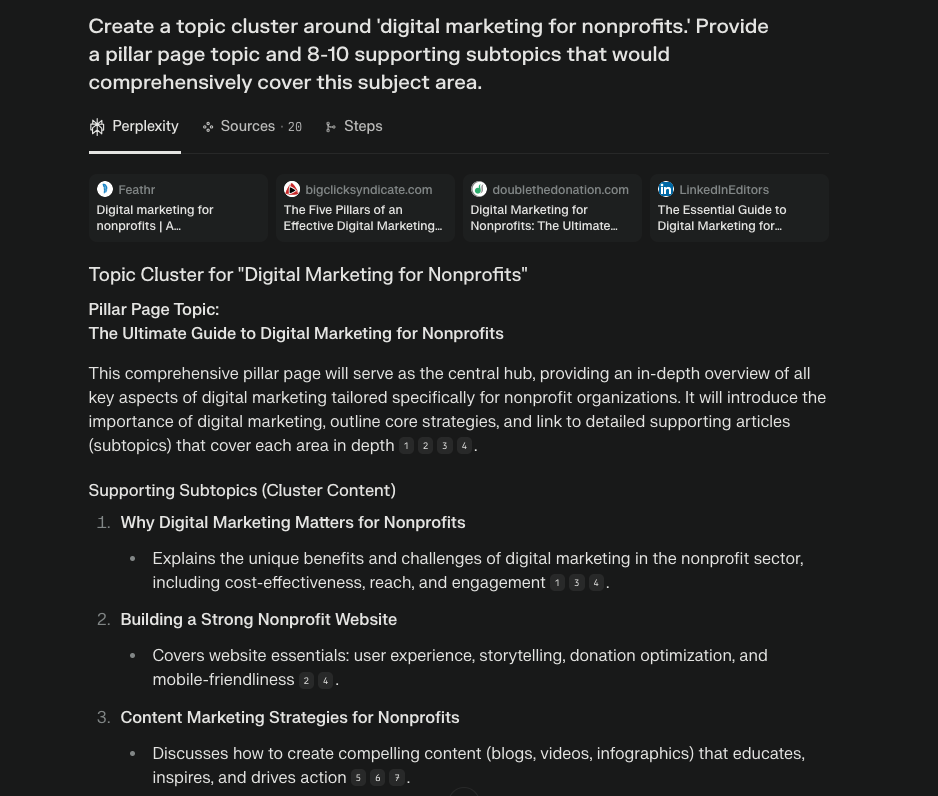
Source: Perplexity.ai
- Crafting Complete Articles or Content Parts
AI significantly accelerates content creation while maintaining quality and depth. Modern AI SEO software can generate comprehensive articles, blog posts, and specialized content sections that serve as excellent starting points for human editors. Still, it’s important to humanize AI-generated content to make it easier for readers to perceive.
Using AI for content creation improves both the speed and depth of the overall article development process. And if you need help with some, let’s say, more challenging sections like FAQ segments, AI got your back as well. Also, use it to generate specific content types, such as product descriptions, meta descriptions, or social media posts. However, remember about the human touch to anything that AI will generate.
Example prompt: “Write a comprehensive FAQ section for a nonprofit organization’s website about volunteer opportunities. Include 8 questions covering application processes, time commitments, training requirements, and impact measurement.”
Given the ongoing discussions about AI-generated content and its detection by search engines, it’s essential to monitor the performance of AI-created pages. Using position tracking tools by SE Ranking allows you to regularly monitor your AI-generated content’s search performance and make data-driven decisions about optimization strategies.
- Content Update and Editing
Regular content updates are like giving your website a fresh coat of paint—essential for maintaining high search engine rankings and user satisfaction. AI-powered tools excel at identifying outdated information, suggesting fresh semantic terms, and recommending structural improvements to existing content.
AI analyzes your content’s performance through Google Search Console integration. That’s the reason why they’re so precise in identifying sections that need refreshing. These tools are also excellent for something that probably every person needs – grammar editing, readability improvements, and plagiarism detection.
Example prompt: “Review this article about social media marketing and suggest 5 ways to update it for 2025. Include new platform features, algorithm changes, and emerging trends that should be addressed.”
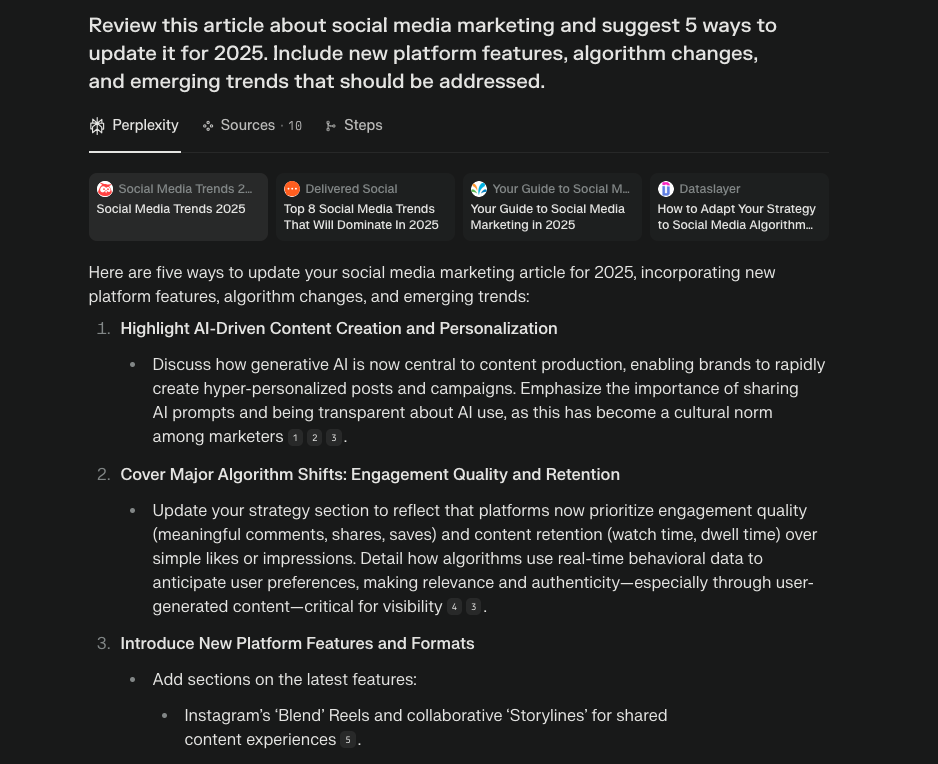
Source: Perplexity.ai
- Technical Optimization
Technical SEO becomes significantly more manageable with AI assistance—it’s like having a technical wizard who speaks fluent code. AI tools can automatically generate XML sitemaps, create schema markup, handle hreflang tags for international sites, and identify technical issues that might impact search performance.
AI SEO software can thoroughly analyze your website and identify, for example, broken links, detect duplicate content, and give you some AI suggestion for specific technical improvements. So, if you know that you have to change something, but don’t exactly know what, it’s your sign to get familiar with AI in SEO.
Example prompt: “Generate schema markup code for a local nonprofit organization’s event page. Include organization details, event information, location data, and ticket information.”
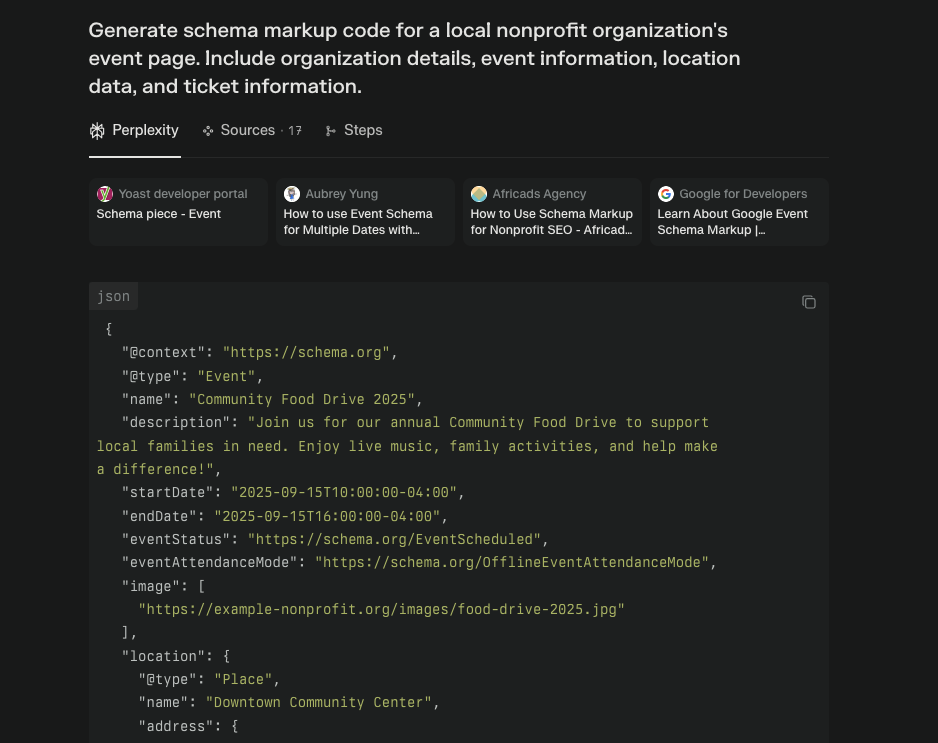
Source: Perplexity.ai
- Competitors Analysis
Now, let’s move to probably one of the most important parts—analyzing your competitors. So, AI-powered competitor analysis provides way deeper insights into the competitive landscape than traditional research. There’s nothing better than AI to do any type of research and analysis.
AI tools analyze your competitor’s content, identify their keywords, and even reveal content gaps that give you opportunities. But that’s not the best part—AI is also capable of processing large amounts of data quickly, patterns in content, backlink strategies, and technical optimizations that you can adapt to your campaigns. That’s why AI for SEO should become your true friend.
Example prompt: “Analyze the content strategy of three leading nonprofit organizations in environmental conservation. Identify their most successful content types, publishing frequency, and topic coverage gaps I could exploit.”
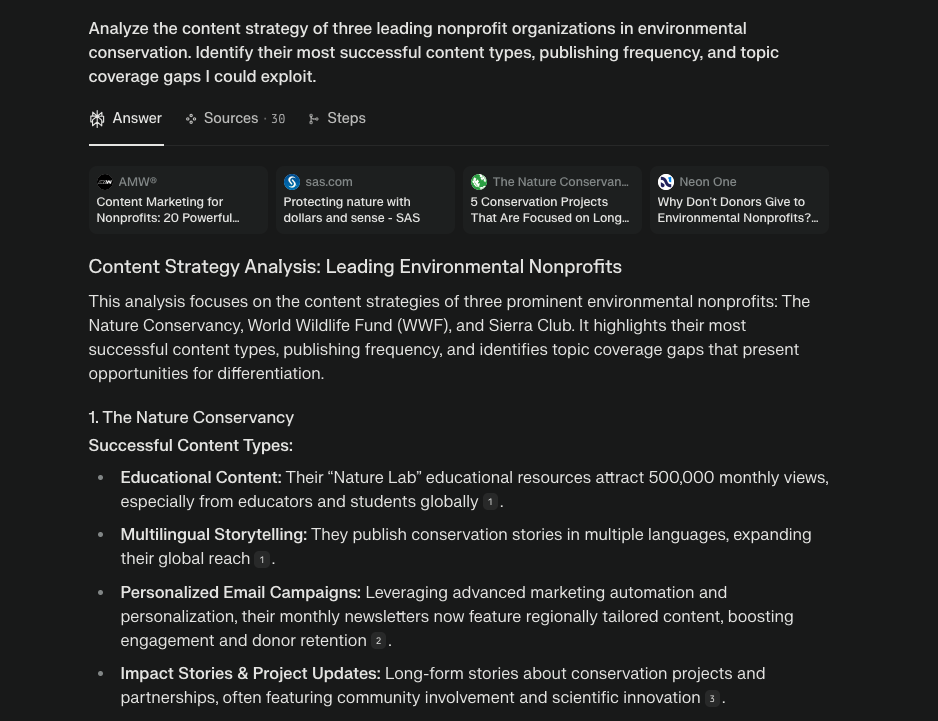
Source: Perplexity.ai
- Big Data and Algorithms Analyzing
Let us show you how great AI really is at analyzing data and how powerful it is at crunching big datasets in seconds. There are some tools that can help identify trends and patterns in user behavior, which is very important for you and your SEO strategy, because user experience in general has a big influence on Google rankings.
Example prompt: “Analyze current trends in sustainable living and environmental awareness. Identify 5 emerging topics that would be valuable for a nonprofit environmental organization to cover in their content strategy.”
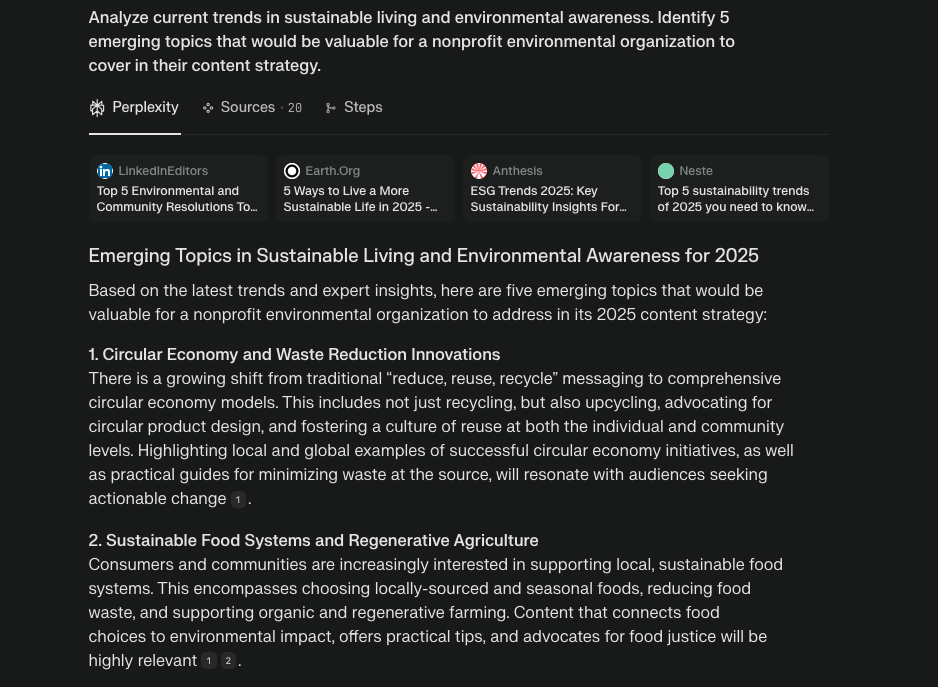
Source: Perplexity.ai
- Internal Linking Improvements
An aspect that many people are forgetting about is internal linking. It used to be a manual task—you would have to do everything manually, going through all of your subpages and linking to relevant content, also from your website.
Thankfully, it’s easier now. All you have to do is equip yourself with the right AI tools, which can optimize your internal linking structure completely by analyzing your content and suggesting relevant connections. Then, you just add the links where AI shows you to, easy, isn’t it?
Example prompt: “Analyze my website’s content about volunteer management and suggest 10 internal linking opportunities that would improve user navigation and SEO performance.”
- Link-Building with AI tools
Link-building is one of the most commonly known parts of SEO activities, and also one of the most important. However, there are tons of updates practically every month regarding link-building.
Fortunately, there are AI tools that can help you automate a lot of tasks. For example, AI analysis (once again) can identify high-quality link prospects, analyze competitor backlink profiles, and suggest how you should approach outreach strategies. New technologies on the market process large databases of potential link sources, freeing up your time from going through tons of websites, evaluating if they’re good or not for your strategy.
Example prompt: “Identify 15 high-authority websites that would be good link-building targets for a nonprofit focused on education equity. Include their contact information and suggested outreach angles.”
Moreover, you can use Agentic browsers to search and qualify link building platforms such as linksman or collaborator pro.
Summary
SEO is changing non-stop. Practically, every day we see some new updates and rules. To stay on top of the SEO game, you have to follow all of the news and updates, especially when it comes to AI, the biggest trend in every market right now.
Try to remember how it used to be with SEO. Days spent researching keywords or writing content. Right now, the biggest game-changer is precision. Artificial Intelligence doesn’t guess what will work for you – it analyzes user behaviour patterns to help you target exactly the right people at the right moment. The content that you’ve spent days on can now be created in hours, without sacrificing quality.


